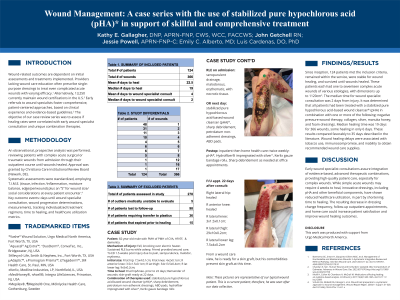Case Series/Study
(CS-062) Wound Management: A Case Series In Support Of Skillful And Comprehensive Treatment
Thursday, May 16, 2024
7:30 PM - 8:30 PM East Coast USA Time

John Getchell, RN – Research Coordinator, Trauma Research, Christiana Care; Jessie Powell, APRN-FNP-C – Acute Surgical Wound Service NP, Surgical Critical Care, Christiana Care; Emily Alberto, MD – Surgical Resident, Surgical Critical Care, Christiana Care; Luis Cardenas, DO, PhD – Acute Surgical Wound Service Medical Director, Surgical Critical Care, Christiana Care
Introduction: Wound-related outcomes are dependent on initial assessments and treatments implemented. Providers lacking wound care education have prescribed single-purpose dressings to treat even complicated acute wounds with varying efficacy. Alternatively, 13,250 currently maintain wound certifications in the U.S. Early referrals foster comprehensive, patient-centered approaches, based on clinical experience and evidence-based guidelines. The objective of our case review series was to assess if healing rates were correlated with early wound specialist consultation and unique combination therapies.
Methods: An observational, prospective analysis was performed, reviewing patients with complex acute surgical or traumatic wounds from admission through their outpatient course until wounds healed. Systematic assessments were standardized, employing T.I.M.E. (tissue, infection /inflammation, moisture balance, edge/periwound) with an “S” for wound size/social considerations at every patient encounter. Key outcome events included days until wound specialist consultation, wound progression determinations, measurements, tracking individualized treatment regimens, time to healing, and healthcare utilization metrics.
Results: Since inception, 124 patients met the inclusion criteria, remained within the service, were stable for wound healing, and survived until wounds were healed. These patients each had one to seventeen complex acute wounds of various etiologies, with dimensions up to 1120cm3. The median time for wound specialist consultation was 2 days from injury. It was determined that all patients had been treated with a pure hypochlorous acid-based wound cleanser* (pHA) in combination with one or more of the following: negative pressure wound therapy, collagen, silver, manuka honey, and foam dressings. The median healing time was 19 days for 366 wounds, some healing in only 6 days. These results compared favorably to 35 days described in the literature. Wound healing delays were associated with tobacco use, immunocompromise, and inability to obtain recommended wound care supplies.
Discussion: Early wound specialist consultations assure integration of evidence-based, advanced therapeutic combinations, providing high-quality patient care, especially for complex wounds. While simple acute wounds may require 4 weeks to heal, innovative dressings, including pHA and other beneficial components, have shown reduced healthcare utilization, in part by shortening time to healing. The resulting decrease in dressing change frequency, follow-up outpatient appointments, and home care could increase patient satisfaction and improve wound healing outcomes.
Methods: An observational, prospective analysis was performed, reviewing patients with complex acute surgical or traumatic wounds from admission through their outpatient course until wounds healed. Systematic assessments were standardized, employing T.I.M.E. (tissue, infection /inflammation, moisture balance, edge/periwound) with an “S” for wound size/social considerations at every patient encounter. Key outcome events included days until wound specialist consultation, wound progression determinations, measurements, tracking individualized treatment regimens, time to healing, and healthcare utilization metrics.
Results: Since inception, 124 patients met the inclusion criteria, remained within the service, were stable for wound healing, and survived until wounds were healed. These patients each had one to seventeen complex acute wounds of various etiologies, with dimensions up to 1120cm3. The median time for wound specialist consultation was 2 days from injury. It was determined that all patients had been treated with a pure hypochlorous acid-based wound cleanser* (pHA) in combination with one or more of the following: negative pressure wound therapy, collagen, silver, manuka honey, and foam dressings. The median healing time was 19 days for 366 wounds, some healing in only 6 days. These results compared favorably to 35 days described in the literature. Wound healing delays were associated with tobacco use, immunocompromise, and inability to obtain recommended wound care supplies.
Discussion: Early wound specialist consultations assure integration of evidence-based, advanced therapeutic combinations, providing high-quality patient care, especially for complex wounds. While simple acute wounds may require 4 weeks to heal, innovative dressings, including pHA and other beneficial components, have shown reduced healthcare utilization, in part by shortening time to healing. The resulting decrease in dressing change frequency, follow-up outpatient appointments, and home care could increase patient satisfaction and improve wound healing outcomes.

.jpeg)